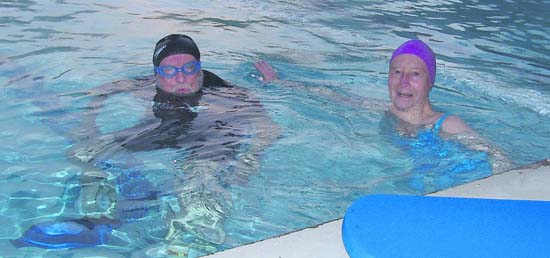| | Published February 4th, 2009
| A Dozen Ways to Age Well
| | By Dr. Theresa Tsingis, D.C., M.S. |  | | Richard (86) and Anna Marie (80) Lininger of Lafayette swim at least one hour every morning at Oakwood Athletic Club in Lafayette. Over the last ten years, Anna Marie went from 10 laps to now swimming a mile a day Photo Andy Scheck
|
My father, with characteristic cynicism and humor, says about aging, "If you're lucky enough, you'll get there!" To further that fortune, why not promote living a longer time in good health? A goal can be to age well, stay vibrant, strong and flexible, and slow down the incidence of disease. My following suggestions are simple and can be added to your daily life with a minimum of expense:
 1) Improve absorption of the food you eat - After age 50, digestive enzyme production decreases, and supplementation may be prudent. When food passes through the digestive tract, the opportunity for nutrient absorption is brief. If food is not absorbed, nutrients are not taken in and nutritional deficits can occur. Full-spectrum digestive enzymes (with proteases, lipases, and amylases) can be taken at low doses with large meals of the day to prevent this.
1) Improve absorption of the food you eat - After age 50, digestive enzyme production decreases, and supplementation may be prudent. When food passes through the digestive tract, the opportunity for nutrient absorption is brief. If food is not absorbed, nutrients are not taken in and nutritional deficits can occur. Full-spectrum digestive enzymes (with proteases, lipases, and amylases) can be taken at low doses with large meals of the day to prevent this.
 2) Lower blood pressure - This can be done through stress reduction, exercise, the intake of omega 3 fats, lower salt intake, biofeedback, and of course, medication. It's important to lower blood pressure in order to decrease strain to the cardiovascular system. In a recent meta analysis, garlic was found to decrease systolic blood pressure. Consult with your doctor or nutritionist.
2) Lower blood pressure - This can be done through stress reduction, exercise, the intake of omega 3 fats, lower salt intake, biofeedback, and of course, medication. It's important to lower blood pressure in order to decrease strain to the cardiovascular system. In a recent meta analysis, garlic was found to decrease systolic blood pressure. Consult with your doctor or nutritionist.
 3) Lower cholesterol - Besides statin drugs, there are a number of ways to lower cholesterol. Fiber can help, since it pulls cholesterol out of the body during digestion. Ground flax seeds are a good form of fiber and also have been shown to reduce the incidence of colon cancer.
3) Lower cholesterol - Besides statin drugs, there are a number of ways to lower cholesterol. Fiber can help, since it pulls cholesterol out of the body during digestion. Ground flax seeds are a good form of fiber and also have been shown to reduce the incidence of colon cancer.
 4) Prevent vitamin B deficiencies - Deficiencies occur from age, alcohol intake, stress, and enzyme defects. Vitamin B12 can be given in the form of inexpensive injections, and can be helpful with maintaining cognitive function during and after stressful incidences. Shots increase tissue levels more rapidly than vitamins.
4) Prevent vitamin B deficiencies - Deficiencies occur from age, alcohol intake, stress, and enzyme defects. Vitamin B12 can be given in the form of inexpensive injections, and can be helpful with maintaining cognitive function during and after stressful incidences. Shots increase tissue levels more rapidly than vitamins.
 5) Increase omega 3 fat intake - These fats assist the body with mood, memory, cognitive function, cardiovascular health, the reduction of inflammation, and skin, hair and nail quality. 1,200 mg. of EPA and 800 mg. DHA are standard adult dosages; this may vary depending on the desired effect.
5) Increase omega 3 fat intake - These fats assist the body with mood, memory, cognitive function, cardiovascular health, the reduction of inflammation, and skin, hair and nail quality. 1,200 mg. of EPA and 800 mg. DHA are standard adult dosages; this may vary depending on the desired effect.
 6) Monitor vitamin D levels - This fat-soluble vitamin is essential for bone quality, and has antidepressant and anti-cancer functions. Many people have low Vit. D levels, and it is most common in the elderly. The blood test is called 25-hydroxy Vitamin D. Genomics tests can also be performed to check for low levels of Vit. D receptors. A person low in receptors would benefit from higher than average doses of Vitamin D, in order to saturate receptors and allow adequate absorption.
6) Monitor vitamin D levels - This fat-soluble vitamin is essential for bone quality, and has antidepressant and anti-cancer functions. Many people have low Vit. D levels, and it is most common in the elderly. The blood test is called 25-hydroxy Vitamin D. Genomics tests can also be performed to check for low levels of Vit. D receptors. A person low in receptors would benefit from higher than average doses of Vitamin D, in order to saturate receptors and allow adequate absorption.
 7) Add fiber - Fiber helps lower cholesterol, and can prevent constipation and colon cancer. Fruits, vegetables, beans, peas, lentils and unrefined grains such as wheat, rye or oat berries are the best source of fiber; refined foods made of wheat and sugar are not.
7) Add fiber - Fiber helps lower cholesterol, and can prevent constipation and colon cancer. Fruits, vegetables, beans, peas, lentils and unrefined grains such as wheat, rye or oat berries are the best source of fiber; refined foods made of wheat and sugar are not.
 8) Avoid/Limit refined carbohydrates - In earning my master's degree in nutrition, I was surprised to learn that carbohydrates are not required for the maintenance of life in humans. The "3 whites", white flour, white sugar, and salt, promote deterioration, not nutrition.
8) Avoid/Limit refined carbohydrates - In earning my master's degree in nutrition, I was surprised to learn that carbohydrates are not required for the maintenance of life in humans. The "3 whites", white flour, white sugar, and salt, promote deterioration, not nutrition.
 9) Exercise - This is one of the main ways to stay young in later years. There are so many ways to stay active - walking, hiking, yoga, weightlifting, classes in dance, jazzercise, aerobics, swimming. The choice is up to you, and depending on your level of ability and interests, quite abundant.
9) Exercise - This is one of the main ways to stay young in later years. There are so many ways to stay active - walking, hiking, yoga, weightlifting, classes in dance, jazzercise, aerobics, swimming. The choice is up to you, and depending on your level of ability and interests, quite abundant.
 10) Stretch - Staying flexible is probably one of the main activities ignored until it is significantly decreased. Yet, stretching can improve coordination, which can save one from falling, losing grip of objects, and associated strains and sprains.
10) Stretch - Staying flexible is probably one of the main activities ignored until it is significantly decreased. Yet, stretching can improve coordination, which can save one from falling, losing grip of objects, and associated strains and sprains.
 11) Manage stress - Divert that stress by staying connected to others. Volunteer, become a mentor, call and email friends and family often. In essence, do not isolate. You are valuable to the community!
11) Manage stress - Divert that stress by staying connected to others. Volunteer, become a mentor, call and email friends and family often. In essence, do not isolate. You are valuable to the community!
 12) Have adventures - Outdoor travel, indoor exploration, it's up to you. Be creative. Express yourself. Try new things. Research shows that those who continue to learn keep brain cells healthy.
12) Have adventures - Outdoor travel, indoor exploration, it's up to you. Be creative. Express yourself. Try new things. Research shows that those who continue to learn keep brain cells healthy.
 In a future article, I will introduce the concept of "healthspan." Until then, be well, take charge of your health, and consult health professionals who are interested in helping you with your health and fitness goals, not just disease management.
In a future article, I will introduce the concept of "healthspan." Until then, be well, take charge of your health, and consult health professionals who are interested in helping you with your health and fitness goals, not just disease management.

|
 | | Dr. Theresa Tsingis, D.C., M.S., practices at Lamorinda Nutrition, 89 Davis Road, Orinda.
She can be reached at drtsingis@comcast.net or (925) 254-1080.
| | | | | | | Advertisement | | |
| | | | | | Comments | | | | | | | | | | | | | | | Subscribe / Unsubscribe | | | | | |
| | | | | |  | | |
| | |  | | |
| | | | | |

